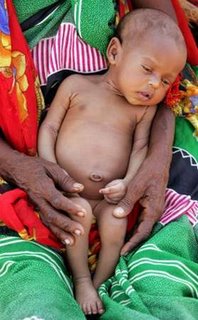

Here's another of those stories that isn't getting much play in the MSM because it doesn't affect domestic politics.
Reuters reports:
LAGBOGOL, Kenya - Deprived of milk since her mother died in childbirth, newborn Mogey lies in her grandmother's lap, too weak to open her eyes or cry for food. [pictured right above]
The 20-day-old Kenyan baby, whose name means "one who has never seen her mother" in the local language, will struggle to survive. Her belly is swollen, her limbs limp.
"She was born one month prematurely as her mother was weak and starving," said her 60-year-old grandmother, Habiba Abdi.
"Now my daughter has died, Mogey is my child and I must somehow try to keep her alive."
In this remote, arid region of northeastern Kenya, the food crisis that is threatening millions of east Africans with starvation has already claimed its first victims.
At least 30 people have died, with dozens more probably also perishing in remote inaccessible areas, local residents and officials say. Many others are showing signs of malnutrition.
Aid agencies have warned that east Africa could be on the brink of a "humanitarian catastrophe" as food stocks dwindle in Kenya, Ethiopia, Burundi, Somalia, Eritrea and Tanzania after poor rains hit harvests.
The severity of the crisis has shocked people in Kenya, east Africa's richest nation and a top attraction for tourists who flock to its reserves and parks for safari holidays.
The number of people who face starvation is spiralling ever higher -- on Wednesday, Kenya's minister for emergency operations said the figure in his country had surged to around 4 million from an estimate of 2.5 million in December.
The United Nations has said that around 6 million people are threatened by hunger across the region.
....Diseases such as cholera are also likely to spread as thousands of livestock die of hunger, leaving decomposing carcasses near villages and water points.
"The sheep have died, the cattle have died and now the more resilient animals such as goats and camels are dying through lack of grazing land and waters," said Ahmed Mohamed Farah, who works for a government body set up to monitor the drought.
"We know from experience that when camels start dying, humans are next."
Read the whole thing here. [emphasis mine]
Until such time as international agencies can be thoroughly reformed so as to become both responsible and responsive the moral burden of dealing with these crises falls disproportionately on the developed world, and particularly on the United States. The Bush administration recognizes this and has dramatically increased aid to Africa while mounting truly heroic responses to natural catastrophes like the Southeast Asian tsunami. At the same time through the appointment of Paul Wolfowitz to head the World Bank [here and here], and the appointment of John R. Bolton to represent the US at the UN Bush has sought to bring some accountability to those agencies. And, together with Secretary of State Condoleeza Rice, has initiated wide-ranging reforms of both the US State Department and USAID. [here] and
Like the war on terror, the war on bureaucratic incompetence and corruption, both in the US and the international agencies, is the work of generations, but it is a matter of immense importance. President Bush deserves high acclaim for undertaking this difficult and thankless task, one guaranteed to generate rising levels of protest from the "professionals" whose comfortable little worlds are being disrupted. In the end, it is possible that this effort at bureaucratic reform will be his greatest legacy to the United States and to the world.
No comments:
Post a Comment